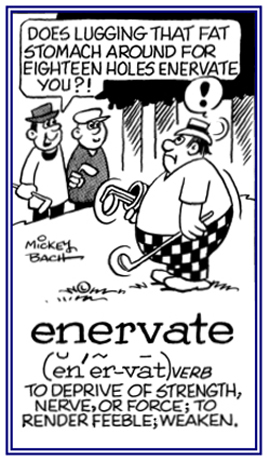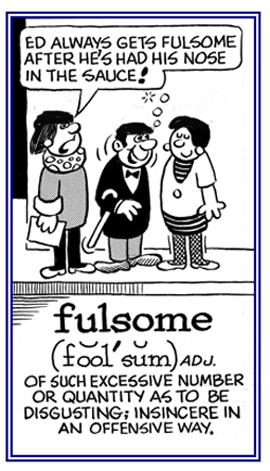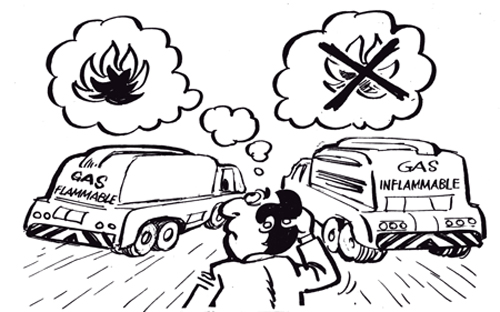Misleading Meanings of English Words
(words that don't mean what they look like or what many people assume that they should mean)
2. Resembling a curved hook like that of an eagle's beak.
In traditional usage, disinterested can only mean "having no stake in an outcome": Since the judge stands to profit from the sale of the company, he can't be considered a disinterested party in this legal dispute.
Despite critical disapproval, disinterested has come to be widely used by many educated writers to mean "uninterested" or "having lost interest".
2. To deprive of strength; to debilitate.
Sometimes people mistakenly use enervate with the meaning "to invigorate" or "to excite". Too many people assume that this word is a close cousin of the verb energize.
In fact enervate does not come from the same source as "energize" which is from Greek energos, "active". It actually comes from Latin nervus, "sinew" and so enervate means "to cause to become out of muscle"; that is, "to weaken" or "to deplete of strength".

Go to this Word A Day Revisited Index
so you can see more of Mickey Bach's cartoons.
2. A monstrous offense or evil; an outrage.
Enormity is frequently misused to refer simply to the property of being great in size or extent, but there are many who prefer that "enormousness" (or a synonym such as "immensity") be used for this general sense and that enormity be limited to situations that demand a "negative moral judgment".
This distinction between enormity and "enormousness" has not always existed historically, but nowadays many observe it.
2. A reference to a large size or quantity; plentiful; generous or abundant: The farmers were happy to have a fulsome harvest despite the severe winter conditions that existed earlier in the year.
Ted's parents served him a fulsome meal to celebrate his birthday.
The original meaning of fulsome was "full, abundant", but the dominant sense of the word currently is conveying offensive to the senses or sensibility."

Go to this Word A Day Revisited Index
so you can see more of Mickey Bach's cartoons.
2. Sufferers of hippophobia usually experience an anxiety when they see horses approaching them.
Historically, flammable and inflammable meant the same thing; however, the presence of the prefix in- has misled many people into assuming that inflammable means "not flammable" or "noncombustible".
The prefix in inflammable is not, however, the Latin negative prefix in-, which is related to the English un- and appears in such words as "indecent" and "inglorious".
Instead, this in- is an intensive prefix derived from the Latin preposition in and it also appears in the word enflame, but many people are not aware of this derivation, and for clarity's sake it is advisable to use only "flammable" to give any kind of warnings about burning or catching on fire.

2. Pertaining to being openly straightforward or frank; candid.
2. A reference to being based on pretense; deceptively pleasing: In old novels, the villain frequently uses meretricious compliments to seduce the innocent heroine.
2. Descriptive of a harmful or dangerous condition or situation: The noisome fumes from the container could cause serious harm to those who are living in the house.
2. A particular system of versification to change from prose into metrical form.
Also see this Index or Menu for a variety of other topics.

